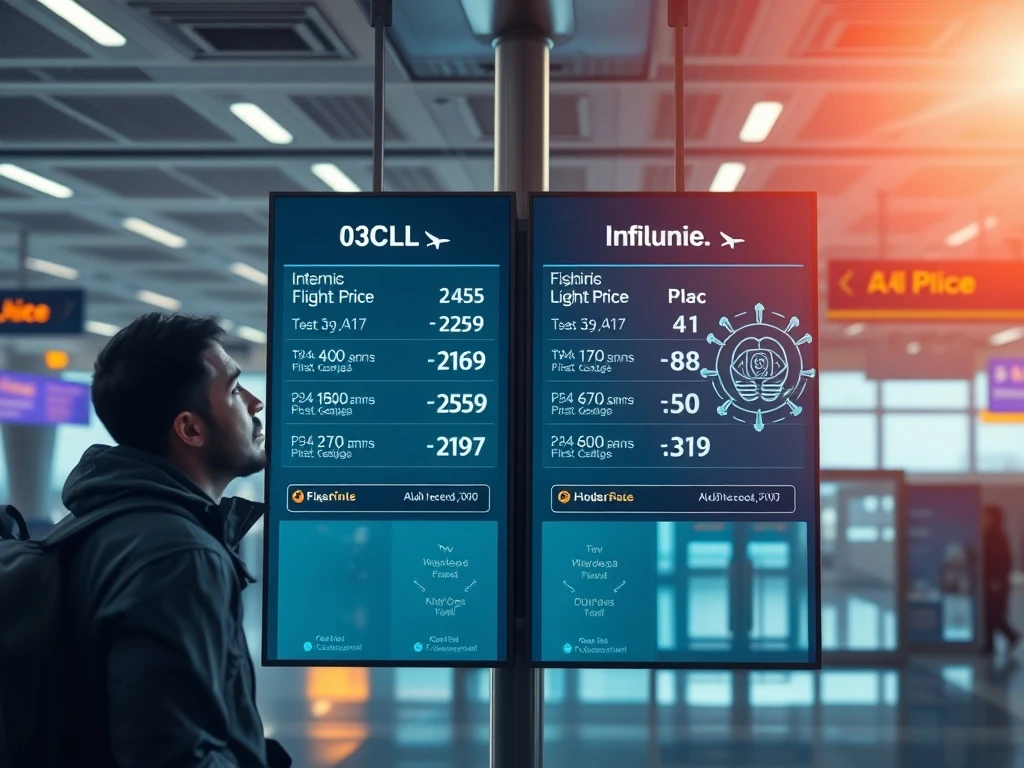AI Pricing: A Looming Threat to Consumer Trust in the Airline Industry

The skies are getting a little cloudier, not from weather, but from a burgeoning debate around AI pricing in the airline industry. A recent clash between aviation giants Delta Air Lines and American Airlines highlights a critical tension: innovation versus consumer trust. As Delta aggressively expands its use of artificial intelligence to set airfares, American Airlines’ CEO, Robert Isom, is sounding the alarm, warning that such practices risk confusing customers and undermining the very foundation of trust in the industry. This isn’t just about ticket prices; it’s about the future of transparency and fairness in how we travel.
The Rise of AI Pricing in Air Travel: A New Era?
Delta Air Lines has made headlines with its ambitious plan to dramatically increase the percentage of tickets priced using artificial intelligence. Currently, only 3% of Delta’s tickets are determined by AI, but the airline aims to expand this to a significant 20% by the end of the year. Delta champions this move, describing AI as a “24/7 super analyst” capable of personalizing fares based on a multitude of factors, from flight timing to individual customer profiles. The promise is streamlined operations and optimized revenue.
However, this rapid adoption of AI pricing isn’t without its detractors. American Airlines, a major competitor, stands firmly against the practice. CEO Robert Isom has publicly condemned the use of AI for fare setting, emphasizing that “Consumers need to know that they can trust American Airlines’ pricing.” His concern centers on transparency and the potential for what he terms “bait and switch” tactics, where travelers might feel manipulated by opaque pricing models.
Navigating Airline Dynamic Pricing: What Are the Real Stakes?
At its core, airline dynamic pricing is not entirely new. Airlines have long used complex algorithms to adjust fares based on demand, seat availability, and booking patterns. However, the integration of advanced AI takes this to a new level, potentially incorporating vast amounts of personal data to determine what an individual customer might be willing to pay. This is where the debate intensifies.
Potential Benefits (from the airline’s perspective):
- Optimized Revenue: AI can analyze real-time market conditions and customer behavior to maximize ticket sales and profitability.
- Personalized Offers: Theoretically, AI could offer more tailored deals, though this is a point of contention for critics.
- Operational Efficiency: Automating pricing decisions can reduce manual effort and respond faster to market changes.
Potential Pitfalls (from the consumer’s perspective):
- “Predatory Pricing”: Critics argue AI could exploit data to charge higher prices for identical services based on perceived willingness to pay.
- Lack of Transparency: The complexity of AI algorithms makes it difficult for consumers to understand how prices are determined.
- Data Exploitation: Concerns exist about how AI might use sensitive data, such as browsing history or income levels, to set prices.
Why Consumer Trust is at Stake in the AI Era
The concept of consumer trust is central to this controversy. When travelers feel that pricing is opaque, unfair, or manipulated, it erodes confidence in the entire industry. Robert Isom’s stark warning, “If customers feel they are being manipulated, the entire business model will suffer,” underscores this critical point. The airline industry relies heavily on repeat business and a positive customer experience, and perceived unfairness can quickly lead to customer churn.
Lawmakers and consumer advocates are echoing these concerns. Senator Ruben Gallego, a Democrat on the Senate Subcommittee, has voiced strong opposition, accusing Delta of prioritizing profit over fairness. The fear is that AI, while efficient, could become a tool for exploitation rather than simply a means of optimizing operations. The industry’s challenge is to balance the undeniable efficiencies offered by AI with the paramount need to maintain public confidence.
The Broader Implications: AI Ethics and Regulatory Scrutiny
The debate around airline AI pricing is a microcosm of larger discussions surrounding AI ethics across various sectors. As AI systems become more sophisticated and pervasive, questions arise about fairness, bias, and accountability. A July 2025 analysis highlighted the urgent need for competition law guardrails to prevent anti-competitive practices, especially when AI algorithms might collude or create monopolies in pricing.
Adding to the complexity is the current regulatory landscape. While the White House has announced an “AI Action Plan” emphasizing rapid adoption of the technology, advocacy groups are worried about a lack of corresponding oversight. Federal agencies have yet to fully address how these advanced AI pricing systems align with existing fair pricing laws, leaving a significant regulatory void that could lead to consumer detriment.
Understanding the Airline Industry Impact Beyond Pricing
The tension between technological innovation and consumer protection has tangible effects on the broader airline industry impact. American Airlines’ recent financial performance illustrates the high stakes. The carrier reported a record quarterly revenue of $14.4 billion, a testament to strong demand. However, this success is tempered by warnings of economic headwinds dampening domestic travel demand. Unit sales in the U.S. market fell 6.4% in Q2 2025, with Isom attributing the decline to economic uncertainty and consumer reluctance.
While international revenue, particularly in the transatlantic market, remains robust, domestic unit income is projected to stay weak in the third quarter. Rising non-fuel costs, estimated to increase by 4.5% in the September quarter, further complicate recovery efforts. In this challenging economic climate, maintaining consumer goodwill and avoiding practices that could deter domestic travel becomes even more critical. The industry must carefully navigate these waters, ensuring that innovation serves both efficiency and equity.
The airline industry stands at a crossroads. The allure of AI’s efficiency and potential for dynamic revenue optimization is powerful, yet the warnings from industry leaders like Robert Isom about eroding consumer trust cannot be ignored. As regulators worldwide grapple with the rapid evolution of AI, the outcome of this debate in the airline sector could set a precedent for how AI is deployed in other consumer-facing industries. Ultimately, the challenge is to harness the power of AI to enhance the travel experience without sacrificing the transparency and fairness that consumers rightly expect.
Frequently Asked Questions (FAQs)
1. What is AI pricing in the airline industry?
AI pricing refers to the use of artificial intelligence algorithms to dynamically set and adjust airfares. Unlike traditional fixed pricing, AI systems can analyze vast amounts of data—including real-time demand, competitor prices, customer profiles, and even browsing history—to determine the optimal price for a ticket at any given moment, often personalized for individual consumers.
2. Why is American Airlines concerned about Delta’s expansion of AI pricing?
American Airlines’ CEO, Robert Isom, has voiced strong concerns that AI-driven dynamic pricing could confuse customers and undermine trust. He fears that opaque AI pricing models might lead to “bait and switch” scenarios or “predatory pricing,” where consumers feel manipulated into paying higher prices for identical services, ultimately harming the industry’s reputation.
3. How does AI pricing potentially affect consumers?
For consumers, AI pricing could lead to highly variable and personalized fares, meaning two people booking the same flight at the same time might see different prices based on their data profiles. While proponents argue it can lead to more tailored offers, critics worry it could result in higher prices for vulnerable consumers or create a lack of transparency, making it difficult to compare prices fairly.
4. What are the regulatory concerns surrounding AI pricing in the airline sector?
Lawmakers and consumer advocates are concerned about several regulatory aspects, including how AI algorithms might use sensitive personal data, the potential for anti-competitive practices (like algorithmic collusion), and whether existing fair pricing laws are adequate to regulate these new technologies. There’s a call for more robust oversight and clear guidelines to ensure fairness and prevent exploitation.
5. Are other industries using similar AI pricing strategies?
Yes, dynamic pricing powered by AI is increasingly being adopted across various industries beyond airlines. Examples include ride-sharing services (surge pricing), e-commerce (personalized product pricing), hospitality (hotel room rates), and even retail (real-time price adjustments). The core principle is to optimize revenue by responding to real-time supply and demand, often with a layer of individual customer data analysis.
6. What does this debate mean for the future of air travel?
The debate signifies a critical juncture for the airline industry. While AI offers immense potential for efficiency and revenue optimization, the industry must balance these benefits with consumer protection and transparency. The outcome could redefine pricing practices, influence regulatory frameworks for AI, and ultimately shape how much trust consumers place in airlines in the digital age.









